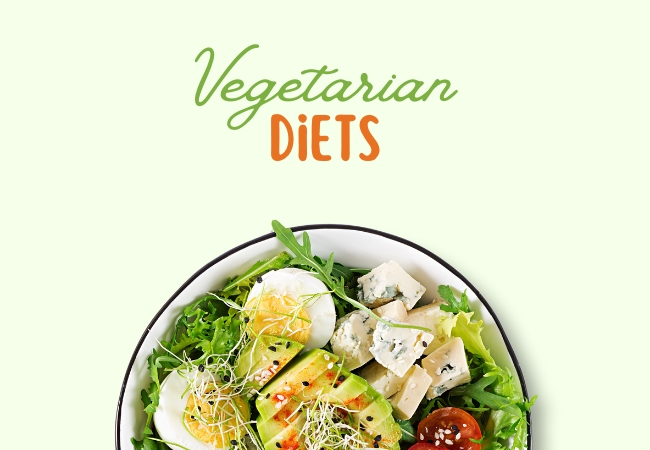Explore the benefits of vegetarianism, and provide key considerations for maintaining a balanced and nutrient-rich vegetarian lifestyle.
In recent years, the popularity of vegetarian diets has soared, driven by ethical, environmental, and health considerations. However, concerns persist regarding the nutritional adequacy of such diets.

Debunking Misconceptions
1. Protein Sufficiency
A common misconception is that vegetarians struggle to meet their protein requirements. Yet, a plethora of plant-based protein sources exists, including legumes, tofu, tempeh, seitan, quinoa, and nuts. With thoughtful meal planning, vegetarians can easily attain a well-rounded protein intake.
2. Health Implications
While vegetarianism can be a healthy choice, it does not guarantee optimal health on its own. The overall quality of the diet is vital. Emphasizing whole, nutrient-dense foods and minimizing processed vegetarian products high in unhealthy fats, sugars, and sodium is key to reaping the health benefits.
3. Nutrient Deficiencies
Another misconception is that vegetarian diets inherently lack essential nutrients. However, with proper planning and variety, vegetarian diets can fulfill all necessary nutritional requirements. Plant-based sources, fortified foods, and supplements can provide nutrients such as iron, vitamin B12, omega-3 fatty acids, and calcium, ensuring a well-rounded and nutritionally sound diet.
4. Muscle Building
Contrary to belief, vegetarian diets can support muscle growth and athletic performance. Numerous vegetarian athletes and bodybuilders serve as living proof. By carefully managing protein intake and following a well-structured exercise program, vegetarians can achieve their fitness goals effectively.
5. Cost Considerations
Some perceive vegetarian diets as more expensive, but a well-planned vegetarian diet can be budget-friendly. Staples like grains, legumes, fruits, and vegetables are often affordable and form the foundation of a nutritious vegetarian lifestyle.

The Benefits of Vegetarianism
1. Enhanced Heart Health
Vegetarian diets, lower in saturated fats and cholesterol compared to meat-based diets, contribute to reduced cardiovascular disease risk, lower blood pressure, and improved overall heart health. The abundance of fruits, vegetables, whole grains, and legumes in plant-based diets provides essential nutrients and fiber supporting heart health.
2. Reduced Risk of Chronic Diseases
Research suggests that vegetarian diets correlate with a decreased risk of chronic conditions, including type 2 diabetes, obesity, certain cancers, and hypertension. The presence of antioxidant-rich foods, coupled with lower calorie and fat content, aids in maintaining a healthy weight and mitigating disease development.
3. Environmental Sustainability
Opting for a vegetarian diet aligns with eco-consciousness. Animal agriculture significantly contributes to greenhouse gas emissions, deforestation, and water pollution. By reducing or eliminating meat consumption, individuals can reduce their carbon footprint, conserve water resources, and contribute to mitigating climate change.
4. Ethical Considerations
Many individuals choose vegetarianism due to concerns for animal welfare. By abstaining from meat consumption, they promote compassion and respect for animals, fostering a more ethical and compassionate world.
5. Increased Nutritional Variety
Vegetarian diets encourage the consumption of a diverse array of fruits, vegetables, whole grains, legumes, nuts, and seeds. This broad spectrum of plant-based foods provides a wide range of essential vitamins, minerals, antioxidants, and phytochemicals, promoting overall well-being.
7 Common diet plans
- Weight Loss Diet
Designed to promote weight loss by limiting calorie intake. These diets often focus on reducing carbohydrate and fat consumption, such as low-carb or low-fat diets.
- Organic Diet
Focuses on consuming organic foods, which are grown or produced without the use of synthetic pesticides or fertilizers. Organic diets often prioritize pesticide-free foods and low-fat options.
- Vegetarian Diet
Eliminates animal-based foods from the diet, including meat, poultry, seafood, dairy, and eggs. However, vegetarian diets can still include plant-based foods like fruits, vegetables, legumes, nuts, and seeds.
- Fasting Diet
Involves temporary restriction of food intake for specific periods of time. This can include intermittent fasting or religious fasting practices.
- Keto Diet
A very low-carb, high-fat diet. The keto diet aims to shift the body into a state of ketosis, where it primarily uses fat as the main source of energy. This is achieved by limiting carbohydrate intake and increasing fat consumption.
- Calorie-Restricted Diet
This diet sets a daily calorie limit for weight loss purposes. Individuals typically create a calorie deficit by consuming fewer calories than they burn each day.
- Hybrid Diet
Combines elements of different diets, such as low-carb and low-fat diets, to meet specific needs and goals.
Potential nutrient deficiencies in a vegetarian diet
While a well-planned vegetarian diet can provide all the necessary nutrients, there are a few nutrients that require special attention:
- Protein
Plant-based protein sources, such as legumes, tofu, tempeh, seitan, quinoa, and nuts, can adequately meet protein requirements. Combining different protein sources throughout the day can help ensure a complete amino acid profile.
- Iron
Plant-based iron sources include dark leafy greens, legumes, fortified cereals, and iron-rich grains. Consuming vitamin C-rich foods alongside iron sources enhances iron absorption.
- Vitamin B12
This vitamin is primarily found in animal products. Vegetarians, especially vegans, should consider fortified foods or supplements to meet their vitamin B12 needs.
- Omega-3 fatty acids
Plant-based sources of omega-3s include flaxseeds, chia seeds, walnuts, and algae-based supplements. Including these sources or considering an algae-based omega-3 supplement is important for vegans.
- Calcium
Dairy products are excellent sources of calcium for lacto-ovo vegetarians, while vegans can obtain calcium from fortified plant-based milk alternatives, tofu, tempeh, leafy greens, and fortified foods.
Key Nutritional Considerations

To ensure a nutritionally balanced vegetarian diet, it is essential to consider the following:
- Embrace Variety
Incorporate a diverse range of fruits, vegetables, whole grains, legumes, nuts, and seeds to maximize nutrient intake and ensure a broad spectrum of essential nutrients.
- Optimize Protein Sources
Combine different plant-based protein sources throughout the day to ensure a complete amino acid profile and meet daily protein requirements effectively.
- Prioritize Nutrient-Dense Foods
Choose whole, minimally processed foods to maximize nutrient intake and minimize empty calories, promoting optimal health and well-being.
- Fortified Foods and Supplements
Consider fortified foods, such as plant-based milk alternatives and cereals, to obtain essential nutrients like vitamin B12 and iron. In some cases, supplements may be necessary, particularly for vitamin B12 and omega-3 fatty acids.
- Seek Professional Guidance
Consult a registered dietitian or healthcare provider to receive personalized advice, especially if you have specific concerns or medical conditions.
Conclusion
Dispelling myths and embracing balance is crucial when considering the nutritional adequacy of a vegetarian diet.
By incorporating a variety of plant-based foods, being mindful of potential nutrient deficiencies, and utilizing fortified foods or supplements when necessary, individuals can thrive on a vegetarian diet while meeting their nutritional needs.
Remember, seeking professional guidance ensures personalized advice and optimal health outcomes.


